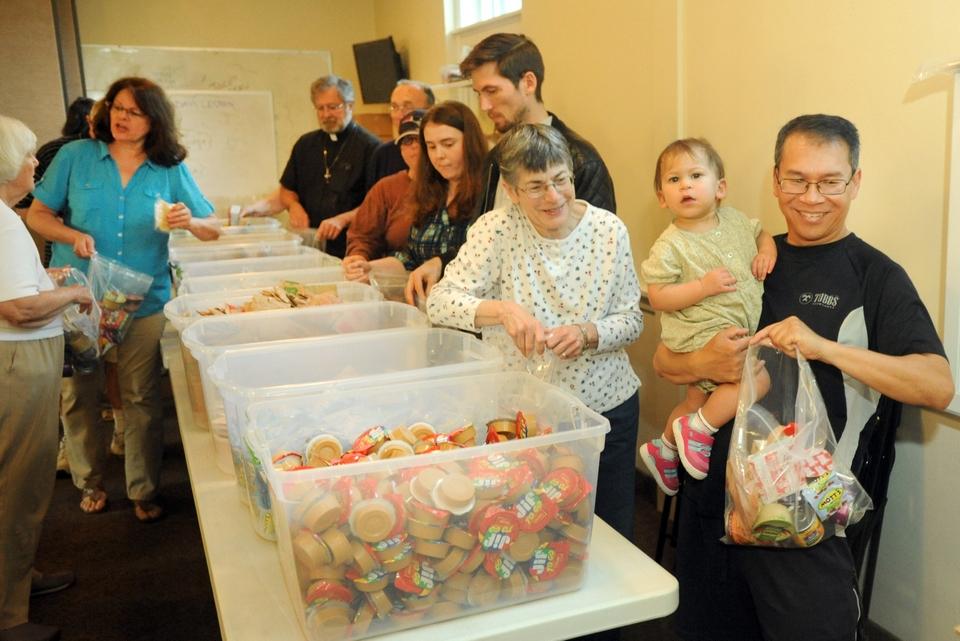Cape programs step up efforts to feed families
Cape programs step up efforts to feed families squeezed by food costs.
EAST DENNIS — Right about the time the bell in the steeple tolls the evening hour at 7, congregants at Grace Church of East Dennis wrap up a prayer service and begin filling plastic bags with food for the Cape’s hungry children.
Boxes of juice, cereal bars and cans of tuna go into bags for the Cape Kid Meals program, which provides 240 bags of food to eight schools each week.
The food bags are meant to tide over needy children on the weekend so they come to school Monday morning nourished and ready to learn, said Cape Kid Meals director Tammy Leone.
“There is a need,” Leone said. “We have students who go into the school nurse program on Monday and they are starving because they haven’t eaten.”
A local chapter of the national Blessings in a Backpack program, Cape Kid Meals is run by volunteers who shop, pack and deliver meals.
Members of the Rotary Club of Bourne-Sandwich run a Wednesday night assembly line at Upper Cape Cod Regional Technical School, and congregants from the Anglican Church of the Resurrection in Brewster help out Thursdays at Grace Church.
Started in 2014 at Ezra H. Baker Innovation School and Nathaniel H. Wixon School, both in Dennis, the program has expanded to include six more — Oak Ridge and Forestdale schools in Sandwich, Peebles and Bournedale elementary schools in Bourne and Barnstable Community Horace Mann Charter Public School.
“There are parts of Dennis and Yarmouth that are hurting. It’s just reality,” said David Johnson, pastor of Grace Church of East Dennis and co-founder of Cape Kid Meals.
His wife, Tricia Johnson, said it was a school adjustment counselor at Ezra Baker who mentioned the Blessings in a Backpack program, which is mainly focused in the southern United States but also has a chapter in Leominster.
Cape Kid Meals works with participating schools to identify which children on the free and reduced-price breakfast and lunch program might need help during the weekend.
Parents and guardians are invited to participate, and at the end of the week school officials discreetly and confidentially tuck the bags of food into children’s backpacks, Leone said.
“The real heroes in all this are the schools,” David Johnson said. “They’re not just educating the child, they are trying to care for the whole person.”
Despite rising employment, people in Massachusetts continue to struggle to meet their food needs, particularly in eastern Massachusetts, according to a report released earlier this month by the Greater Boston Food Bank.
“Map the Meal Gap 2017,” a report from Feeding America that looks at food insecurity and costs on a county level, said food-insecure residents of Barnstable County face the greatest weekly food budget shortfall in the state, at $22.65, compared with $19.21 statewide.
Children bear the brunt of food insecurity, with one in eight children in eastern Massachusetts being food-insecure, according to the Greater Boston Food Bank. In Barnstable County, more than 9.4 percent of people are considered food-insecure.
There are different levels of food insecurity, from being worried about running out of money for food to skipping meals and going a day or longer without food, Diane Schanzenbach, a senior fellow at the Brookings Institution in Washington, D.C., said.
Although food is a basic need, “it’s often one place where you can cut back,” she said.
With rents going up and wages stagnating, “folks are really getting squeezed,” Schanzenbach said. “It’s like a shell game. What do I have to pay off now? These are really hard trade-offs.”
“In Massachusetts, one-third of folks struggling with hunger are ineligible for government programs, as compared to a quarter nationwide,” Catherine D’Amato, president and CEO of the Greater Boston Food Bank, said in a press release.
“And even those who do receive government assistance regularly run out of benefits before the end of the month. In both situations, the emergency food relief assistance becomes the only alternative for these families,” D’Amato said.
Private charities including the Family Pantry of Cape Cod in Harwich and the Falmouth Service Center have been stepping up their food pantry services to meet increasing need for food relief for older people and families.
Cape Cod Community College has a food pantry run with donations from the Family Pantry of Cape Cod, and a new food pantry opened at Barnstable High School in March with the help of the Greater Hyannis Chamber of Commerce.
“Teen hunger is a real thing,” Barnstable Public Schools lead nurse Pam Ciborowski said.
The Food for Kids program, which provides meals to children during summer vacation, is expanding on the Cape, and a mobile food van operated by Cape Organization for Rights of the Disabled has been helping people with disabilities since March through food deliveries ranging from Yarmouth to Provincetown.
Cathy Bennett, of Brewster, said the CORD deliveries have been helping her stretch her Supplemental Nutrition Assistance Program dollar and feed her elementary-school-age son.
“There’s been times we cut way back,” Bennett said. “I have $10 left on my food stamps. But I have to make sure we have enough milk for the next two weeks.”
Since she’s not able to drive, having the CORD van come to her housing complex, where she can pick out food her son will like, has made all the difference, Bennett said.
At Barnstable Community Horace Mann Charter Public School in Hyannis, 26 children participate in the Cape Kid Meals program, and they look forward to their Friday deliveries, said Krista Swanson, school adjustment counselor.
“It’s actually been fabulous,” Swanson said. “I wish I could provide for a lot more families.”
— Follow Cynthia McCormick on Twitter: @Cmccormickcct.

